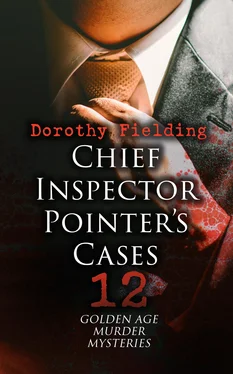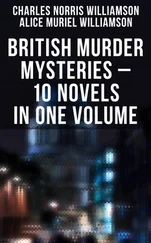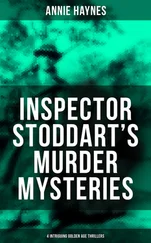Thornton shot him one of his unreadable glances as shook his head vaguely.
"What was it that made you go over the top?" Bond asked Thornton curiously. He could not imagine Thornton sufficiently stirred to take the initiative in anything.
"Oh, just a vague feeling that I wanted a competent judgment on the whole matter. To settle doubts once and for all. Mr. Brown here is very kindly spending the last days of his leave with me."
"Well, I wish to Heaven that we could be of some use," Cockburn said regretfully. "Isn't there anything we can do, Chief Inspector?"
"Anything?" echoed Cockburn.
Pointer thought a moment. Any light thrown on Rose Charteris's circle was all to the good. But friends of that same circle? Thornton, for one, an actual member of it? And young men who climbed into library windows?
"Are you staying for the rest of the night?" he asked.
Cockburn spoke of the Medchester Arms, but Thornton put his second spare room and a Chesterfield at the disposal of the two. His shed only held his own cars, but, as before, they could run their Buick into the colonel's garage.
"Is your garage always locked, sir?" Brown asked Thornton. "I left a notebook in your car when I came, I'm afraid."
Thornton ran his fingers into his pocket, but his expression betrayed his amusement at Scotland Yard's brilliance.
"Here's the key. Yes, I always keep it locked. Wilkins has a duplicate, if you should leave anything else behind you, and I'm out."
"But what about us?" queried the two friends. "If we can be of any use, we'll do anything."
Brown blinked at them.
"Then suppose, when the postman calls to-morrow at Stillwater House, one or other of you could be on hand and get hold of any letters that come for the colonel. I want them steamed open, the contents copied, and the letters carefully closed to show no signs of—"
"Look here, Chief Inspector, what do you take us for?" Bond broke in stiffly.
"Sweeps?" suggested Cockburn hotly.
"No. Amateur detectives," Pointer said innocently. The two men laughed ruefully.
"I see your point. Considering the prod it's just given us, I may well. So we can't be of any help? Rank outsiders, eh?" Bond was a trifle piqued.
"If you'll come out with me in the morning, and show me where that shot seemed to come from, I should be very grateful," and Pointer arranged for a meeting at eight.
"And now I think I'll get a wink of sleep." He left the three together.
"I hope he's up to the work," Bond said gloomily. "Of course one has to discount the make-up and those frightful clothes, but even so, I'm not impressed with the quality of his brains."
"You don't need brains at the Yard," Cockburn complained. "Their place seems to be generally supplied by something called 'information to hand'. With that—whatever it is—you may do quite well. Without it, you're lost."
And the meeting broke up with a vote of lack of confidence in the man who was apparently looking for the wink of sleep of which he had spoken, among the colonel's chutney cases.
There were two of them below stairs. Neither was corded now.
Next morning Pointer found the three men from the cottage very punctual.
"I was walking somewhere about here," Cockburn waved a hand towards a clump of trees. "The shot came from directly in front of me. But I'm afraid that I can't be more exact as to where I stood at the moment."
"I picked up a matchbox yesterday morning a little to the left of us." Pointer pulled one out of his pocket "Is it by any chance yours? That might settle the place where you were standing when you used it."
It was Cockburn's. He pocketed the little silver slab with thanks. "I dropped it when the shot startled me. So it came from over there." He pointed ahead of him. It was where, much farther off, lay the sand-pit.
Now Thornton had indicated another direction in the account that he had given Pointer. He waved his hand towards it energetically. "Surely you said from over here!"
"And I thought you said this way." Bond took a turn at flapping his arms around The three looked for all the world like signallers at a first practice.
Pointer was used to this sort of thing from amateurs. Bond finally came over to Cockburn's unchanging certainty as to whence the sound had reached him the night before. Thornton, however, was, or appeared to be, unconvinced. But as he had been so certain in talking to the Chief Inspector, he could not be expected to change now, if only to save his face.
Table of Contents
A FEW minutes later that same morning, Mr. Gilchrist, the Coroner for West Hertford, and incidentally the Stillwater family solicitor, rang up Colonel Scarlett. He explained that a letter had come for him from Doctor Metcalfe last night, but that he had not noticed it till now. In it he learnt, to his own boundless surprise, that the doctor refused to issue a certificate of Miss Charteris's death without a post-mortem, which painful preliminary would take place this morning, Saturday, before the inquest.
Colonel Scarlett turned away from the instrument with a gray line around his mouth. He was already pale enough under his tan. He stood for a moment in deep thought. Then he walked into the breakfast room, where Paul hastened to bring him the morning papers.
"Look here, Paul—" The colonel paused. "Shut the door. There's an infernal draught this morning. I want to speak to you. It seems the doctor isn't satisfied about the cause of Miss Rose's death. God only knows what he means by that. Now the inquest may spread into other fields, and I do not want the professor's private affairs needlessly broadcasted. You know how he would dislike that."
"Yes, sir. He would indeed."
"In his own way the professor is one of the cleverest of men, but not in all ways. Dear me, no! Not in all ways. He particularly desired that no word should get about of his having to go to Genoa. I'll tell you why. Frankness is always best. My brother-in-law is on the eve of concluding some very important and very delicate negotiations there. One breath about them, and they are off. I may mention that I, too, am financially interested in the matter, and have a very personal concern in silence on the point. Now the professor has unfortunately mentioned Genoa in a letter of his. The point is, I do not want that town referred to at the inquest, or at all. You understand? Italy, of course. He's in Italy. But not Genoa. I know he would very much resent this. You understand?"
"Yes, sir. I quite understand. Italy if need be, but Genoa not in any case," Paul summed up. The colonel drew a deep breath as he made for the library. Now for Sibella.
He had not seen his daughter this morning, or at all since the dreadful news of yesterday. He sent up word that he would like to speak to her downstairs.
He stared at her when she entered the room, and Sibella stared back at him.
Each face showed marks that had not been there before. Each eyed the other distrustfully.
"Things have taken a very unpleasant turn," the colonel spoke without looking at his daughter, "very unpleasant. There's to be an autopsy."
She stared at him without comprehending.
"You mean—on Rose?"
"For God's sake, don't act the idiot!" snapped her parent. "On who else, pray?"
"But—but—-" she passed her tongue over her lips, "that means—?"
It was his turn to stare at her.
"It means that they want to know how she died. You know what an autopsy is. They want to know what killed her."
Sibella sat speechless. She would have given a close observer the impression of buckling on some armour.
"I see," she said finally. "I wish you would tell me what you have heard about it."
"I don't know anything more than I have told you." The colonel gave her the message that had reached him over the telephone. "But the point is this, Sibella. Your uncle is in Italy; that's nothing to do with Rose's terrible accident, but all sorts of questions may be asked. The point is, I don't want Genoa mentioned."
Читать дальше












